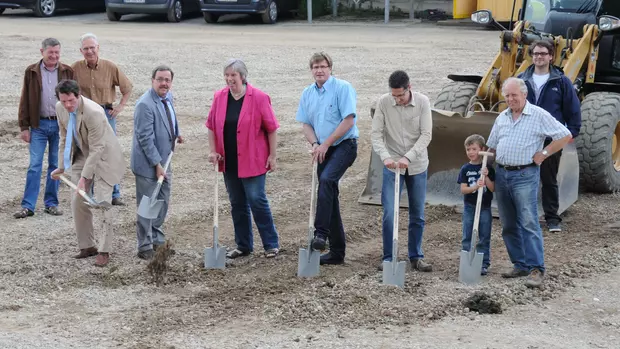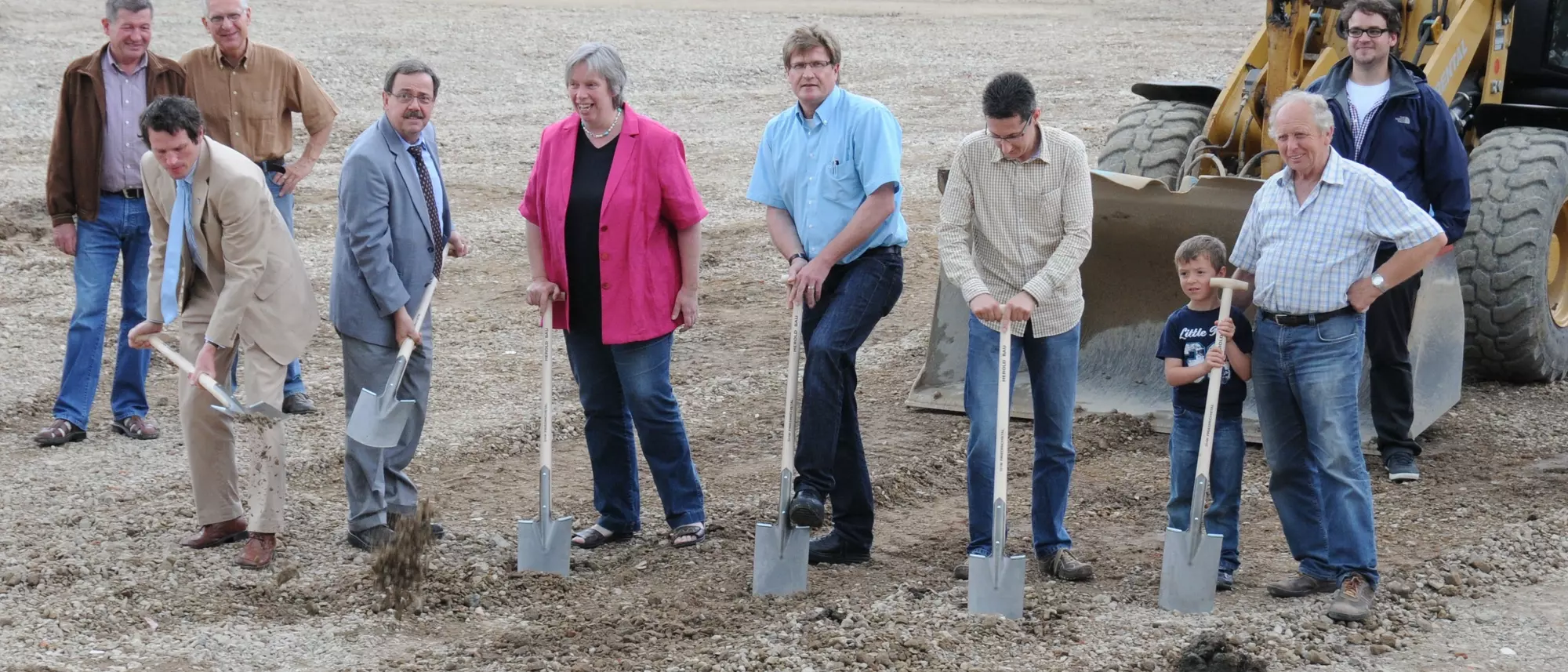
On 12 June, the starting signal was given for the construction of the new biogas plant in Heuchelheim. Representatives of the district of Giessen, the municipality of Heuchelheim and Stadtwerke Giessen (SWG) celebrated the official ground-breaking ceremony. SWG plans to put the plant into operation before the end of this year.
Decentralised and renewable are two of the most important attributes that will characterise power generation and power supply even more than today. However, Reinhard Paul, CEO of Stadtwerke Gießen (SWG), believes that building solely on photovoltaic and wind power plants is the wrong approach and assures: "We still need types of generation that are base load-capable and at the same time characterised by a positive environmental balance." He also points out: "The German government is also convinced that the challenge of the energy transition cannot be mastered with wind and solar alone. That's why it has set a target of increasing the proportion of electrical energy from combined heat and power (CHP) to 25 per cent of national electricity demand by 2020."
Regional biogas production will also play an important role in connection with CHP. The motto is: utilise existing resources locally instead of relying exclusively on fuel from the Middle East or Russia. SWG's extremely efficient biogas plant in Großen-Buseck proves that this model works successfully. "We soon want to exploit the potential of generating electricity and heat with biogas from the region at another location in the district of Giessen," emphasised Matthias Funk, Head of the District Heating Department at SWG, after the ground-breaking ceremony for the construction of the new biogas plant in Heuchelheim on 12 June.
Plant trimmed for efficiency
At the ceremonial start of construction last Wednesday, Dr Christiane Schmahl, District Councillor for the district of Giessen, explained: "Projects such as the biogas plant in Heuchelheim help to drive forward the energy transition and save climate-damaging CO2. They also increase local added value, which also benefits the region."
Once the plant has been completed, cattle slurry and manure from the farm of local farmers Torsten and Hans Klug as well as grass and maize silage will be used for biogas production - in a ratio of 60 to 40. However, according to the farmers, the demand for maize and grass plants for fermentation does not require a large-scale expansion of the respective cultivation areas for the plants. This refuted the arguments of sceptics, who often point to the presumed connection between increased biogas production and the growth of monocultures.
Reinhard Paul also emphasised: "When planning the plant, we took numerous criteria into account that are decisive for a positive environmental balance: Travel and delivery routes as well as the optimum mix of biomass for the Heuchelheim site all played a role." SWG also works together with the Technical University of Central Hesse (THM) on its biogas projects. "Together with THM, we are optimising the fermentation processes to achieve even greater efficiency," explained Paul.
More than 2 million kilowatt hours per year
From the end of 2013, a combined heat and power plant (CHP) on the site will use the biogas to generate more than 2 million kilowatt hours (kWh) of electricity per year - enough to meet the needs of around 600 households. The CHP plant also produces over 3 million kWh of heat per year using the CHP principle. This is enough to supply around 160 single-family homes in the neighbourhood with renewable energy from the region. There are plans to connect the CHP plant to the Rinn & Cloos district heating network and to the heating network of the construction site near the Heuchelheim swimming pool.
"We look forward to soon covering an even greater proportion of the electricity and heating requirements in our municipality with climate-friendly energy and serving as a kind of role model for other municipalities in the district of Giessen," emphasised Lars Burkhard Steinz, Mayor of Heuchelheim, after the ground-breaking ceremony.
SWG intends to continue realising projects like the one in Heuchelheim with towns and municipalities in the future in order to drive forward the energy transition in the region. "Our experience in the field of CHP goes back several decades and our focus on decentralised generation has proven to be the right approach," emphasised Matthias Funk. He considers biogas to be a key building block in the foundation of this strategy. However, Reinhard Paul pointed out: "Biogas is part of our energy mix - but the fuel is only one part. On the scale we are using it, it makes perfect sense - from an economic point of view and in the interests of the population in the Central Hesse region."

